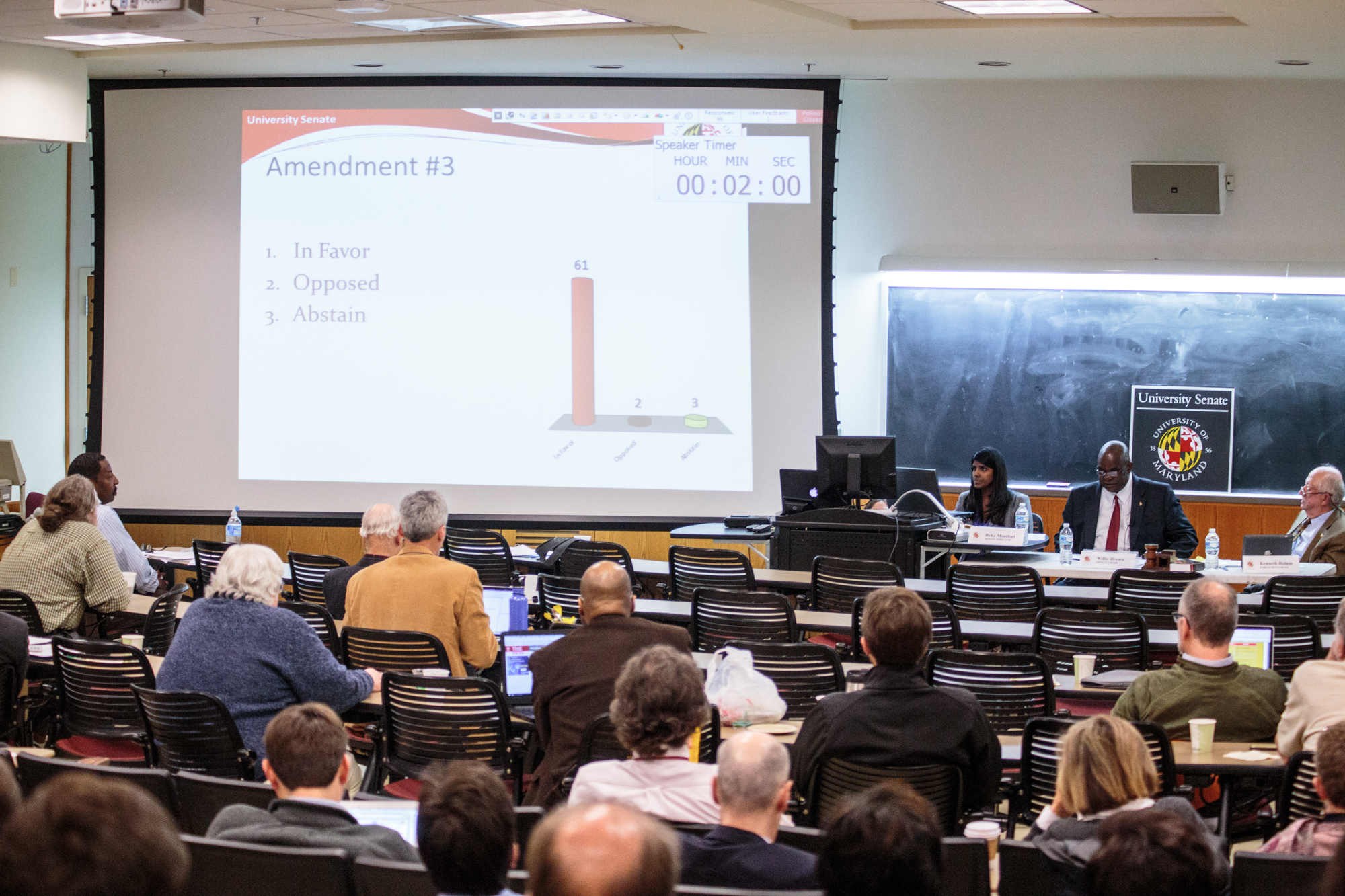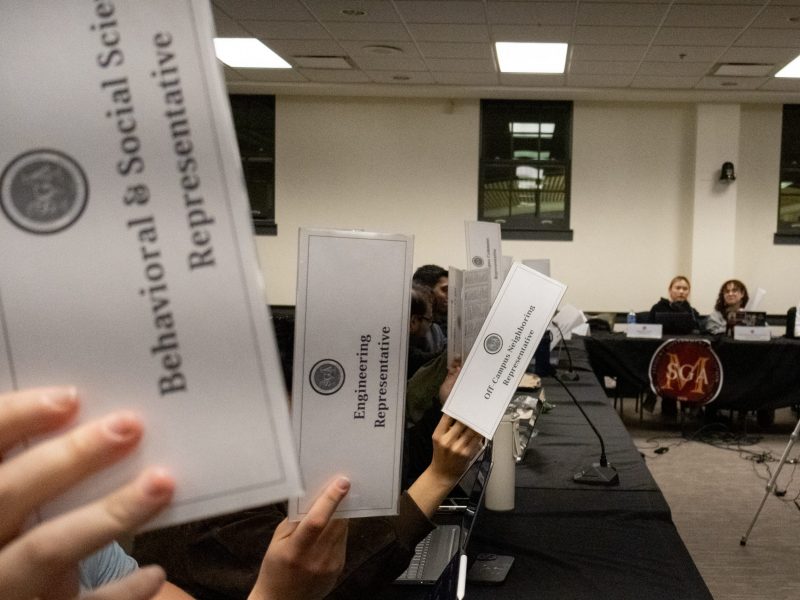The University of Maryland Senate voted Wednesday to mandate more sexual assault prevention and bystander intervention training for students, faculty and staff.
The senate voted 95-5, with one abstention, to support the proposal, which would require all first-year students to complete face-to-face bystander intervention training along with already-mandated online sexual misconduct compliance training, said Sexual Assault Prevention Task Force Chair Steve Petkas. The task force drafted and presented the proposal.
The bill now moves to university President Wallace Loh, who can veto or approve it.
If approved, incoming undergraduate students — starting with fall 2018’s class — would have to complete a 50-minute in-person training by April of their first year at this university. Second-year students would have to complete new online training starting in fall 2019, and third-year students would also have to complete new online training starting in fall 2020. Fourth-year students would not face additional mandatory training.
[Read more: A University Senate task force wants to expand sexual assault training programs]
The second-year online training would focus on consent and healthy relationships, along with the role alcohol and drugs can play in facilitating sexual assault. Third-year online training would discuss “the complex relationship between alcohol and sexual assault,” according to the bill’s senate document.
“We are trying to achieve a cultural shift of intolerance of sexual assault,” Petkas said at the meeting. “We want to send massive and multiple signals that we don’t allow it and that we don’t sanction it.”
Graduate students, who are currently required to complete online sexual assault training, would also have to view sexual misconduct prevention presentations at their orientations starting fall 2018. Graduate assistants, who currently aren’t required to complete any additional training, would start mandatory sexual assault prevention training online as well starting in fall 2019.
If Loh approves the programs, they will all be fully implemented by 2021, Petkas noted.
This university currently requires online compliance training for faculty, staff and first-year students, as well as a video viewing on sexual assault and bystander intervention during the two-day summer orientation programs for incoming students.
But it isn’t enough, Petkas said.
About 40 percent of male students and about 38 percent of female students surveyed in the Office of Civil Rights and Sexual Misconduct Report said they had not received information on how to prevent sexual assault since enrolling at this university.
“Our students are not getting the training they need to protect themselves in our community from sexual assault,” senate chair Jordan Goodman said at the meeting.
The sexual assault task force — a 16-member group whose members include SGA President Katherine Swanson, Title IX Officer Catherine Carroll, CARE and University Police representatives — formed in October after recommendations from Loh and Goodman.
On top of proposing the new mandatory initiatives, the task force’s bill also pushes for the establishment of a campuswide campaign strategy and the creation of a centralized website to house all campus sexual assault prevention programs and information starting in fall 2018.
Other parts of the bill included a recommendation that a student group’s leader and at least one other leader be required to complete online sexual assault prevention training before the group becomes a recognized organization. The task force’s initial report at a Feb. 9 senate meeting had proposed mandating training for all student group members, which some student senators were against.
The bill also included a recommendation to form a committee to implement a prevention plan, which would provide annual reports to the senate and Loh’s cabinet.
“The recommendations … help UMD make continued progress toward prioritizing prevention and creating meaningful change on our campus,” Carroll wrote in an email.
Petkas said task force members want to enforce these training programs through registration blocks, but Goodman said this might be difficult to implement without an automatic process, as blocks must be manually removed.
While many approved the bill, others didn’t think it went far enough.
“It lacks training that directly confronts perpetration — dynamics of sexual violence, rape culture, rape myths, the profile of a perpetrator — and is dominantly composed of training on positive bystander intervention and risk-reduction,” undergraduate senator J.T. Stanley said.
[Read more: “Reclaim this campus for them”: UMD students support sexual assault survivors via sit-in]
Stanley, a senior individual studies major, joined students from other groups such as the SGA’s Sexual Misconduct Prevention Committee and Preventing Sexual Assault in proposing four amendments — including recommending the university create a Sexual Violence Prevention Fund and recommending online training that confronts perpetration — on the senate floor. All of them failed.
“The idea is valuable, but has nothing to do with our charge,” said Petkas, referencing the proposed student amendments. He added that the prevention fund was also outside the task force’s purview because the force “was not called upon to create budgets.”
Undergraduate student senator Benjamin Douek proposed another failed amendment to allow students to opt out of a sexual assault prevention program if a certain lecture or discussion focuses on topics contrary to what their religion preaches.
“It’s a hard time for minorities on this campus, and we want people to feel welcome here,” the junior history major said during Wednesday’s meeting. “If we don’t accommodate religious students, the university will become a hostile place for students with religious needs.”
Petkas said there is already a mechanism in place through the Office of Civil Rights and Sexual Misconduct that lets sexual assault survivors opt out of the trainings on a case-by-case basis, and he noted that this could work for religion as well.
Boris Lushniak, public health school dean, also submitted two amendments to the bill. One amendment called for adding faculty with sexual assault prevention expertise to the task force’s proposed prevention plan committee. Another ensured the public health school’s office of planning and evaluation plays a role not just in helping the prevention committee evaluate the recommendations but also improving them, if they’re implemented.
This university’s shifting approach to addressing sexual misconduct dates back to 2012, when Loh and the Senate created a Joint President/Senate Sexual Harassment Task Force. In October 2013, the task force presented recommendations to the senate, including the creation of a more comprehensive university policy on sexual misconduct, the establishment of the Office of Civil Rights and Sexual Misconduct — which formed in March 2014 — and the development of the Rule of Thumb campaign to educate the campus community about sexual misconduct, according to senate documents.
University efforts to improve sexual misconduct education have led to an increase in the number of reported cases and investigations, according to senate documents. Sexual misconduct reports increased by 64 percent between the 2014-15 and 2015-16 school years, according to The Office of Civil Rights and Sexual Misconduct’s 2015-16 Student Sexual Misconduct Report.
Even though his amendments failed at Wednesday’s meeting, Stanley said he believes these recommendations will further improve sexual assault prevention education.
“At the end of the day, it was the fruition of 17 months of work, and to see it through from beginning to end is wonderful,” Stanley said. “It’s a watershed moment in terms of success with this issue, and I’m proud to have seen it get here.”
Senior staff writer Talia Richman contributed to this report.



